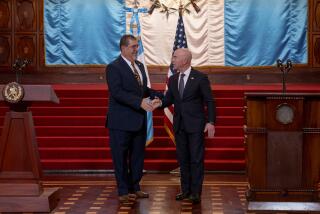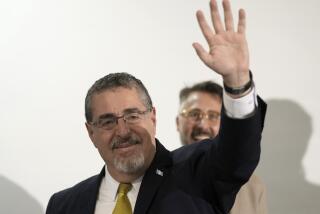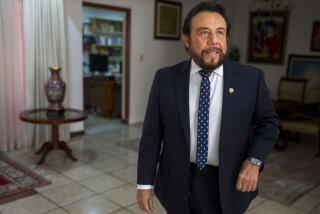Nicaragua’s Neighbors All Agree That Sandinista Regime Must Go, Shultz Says
BOGOTA, Colombia — Secretary of State George P. Shultz said Thursday that all of Nicaragua’s Central American neighbors agree that the only way peace can be achieved in the region is through the removal of the leftist Managua government.
After a lunch with the presidents of Costa Rica, Honduras and El Salvador and the foreign minister of Guatemala, Shultz said there is general agreement that the only solution to Central America’s problems “is the emergence in Nicaragua of a government that is based on the consent of the people and includes the freedom to worship, to write, to assemble and to vote.
“As long as there is an aggressive, totalitarian regime in Nicaragua, there is not going to be an opportunity for genuine stability and progress in Central America,” he said. “Just how that (replacement of the Sandinista regime) is to be brought about, people had differences of views about. That it must be brought about is very clear to everyone.”
Shultz came to Bogota to attend the inauguration of President Virgilio Barco Vargas, but he turned the visit into a seminar on Central America, sounding out key leaders on the Reagan Administration’s hard-line policy against the Sandinista government in Nicaragua.
U.S. officials said Shultz was pleased with what he heard in meetings with Presidents Jose Napoleon Duarte of El Salvador, Oscar Arias Sanchez of Costa Rica, Jose Azcona Hoyo of Honduras, Jaime Lusinchi of Venezuela and Barco, as well as officials of Peru and Guatemala.
A senior State Department official, who asked not to be identified by name, said the Central American leaders seem to have virtually given up on the chances of success of the stalled Contadora process, in which several nations are seeking an accommodation between Nicaragua and the rest of Central America.
One official said that Barco, in a private meeting with Shultz before the inauguration, suggested that the Organization of American States should have an expanded role in Central American peacemaking, in effect giving the United States a formal role that it does not have in the Contadora Group.
Colombia is a founding member of the Contadora Group. But the U.S. official said Barco seems to be less enthusiastic about it than his predecessor, Belisario Betancur.
Although the U.S. official said the United States has not changed its official policy in support of the Contadora process, he said the United States is “willing to entertain proposals” to widen the diplomatic procedure, through the Organization of American States or some other forum. Despite the official stance in favor of the Contadora process, U.S. officials have privately expressed strong reservations about it.
The senior State Department official said the Central American leaders showed no interest in the Contadora process.
“They didn’t raise Contadora, which I think is compelling,” the official said.
Barco has called a meeting today in Bogota of the four member nations of the Contadora Group--Colombia, Venezuela, Mexico and Panama--and the members of the Contadora support group--Brazil, Argentina, Peru and Uruguay--to take stock of the entire initiative.
Shultz said that despite U.S. budget problems, he promised continued economic support for Latin American democracies. But he emphasized that a change of policy in Nicaragua is essential for economic development of the region.
“There was a feeling that the Sandinistas are becoming worse and worse and the situation is deteriorating,” the senior State Department official said.
More to Read
Sign up for Essential California
The most important California stories and recommendations in your inbox every morning.
You may occasionally receive promotional content from the Los Angeles Times.










